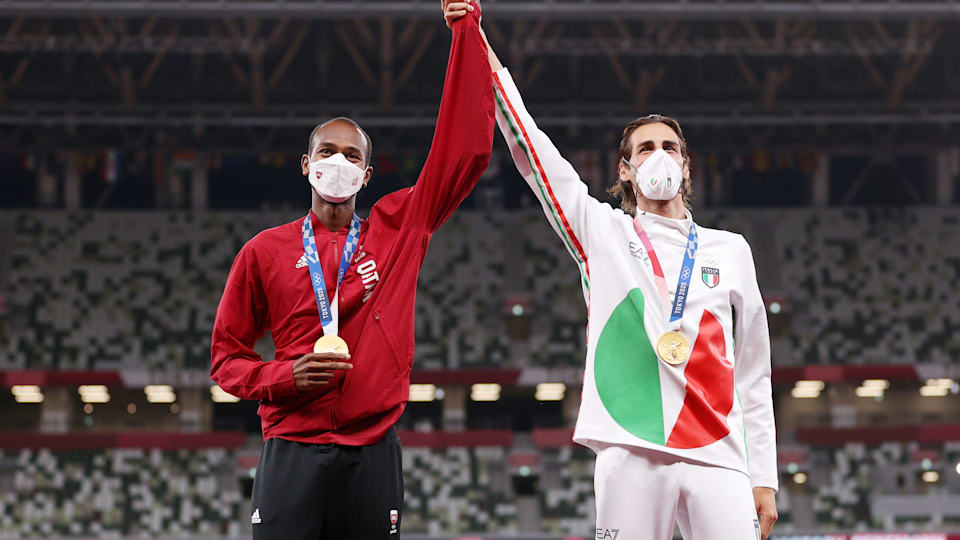Explore the unforgettable stories of shared Olympic gold medals, moments where victory turned into celebrations of unity, mutual respect, and an unbreakable bond forged under the world’s brightest spotlight.

Picture by 2021 Getty Images
A lifetime of preparation for one moment to shine. One change to prove that you are the best in the world, possibly of all time.
The difference between gold and silver? Sometimes, it's a mere fraction of a second, a single kilogram, or the width of a blade of grass.
Some sports are decided by photo finish technology, others by the naked eye or the score of a judge. Some have protocols such as tiebreakers, overtime, extra innings or shootouts to decide the winner of the most coveted title in all of sport.
But what happens when two athletes, after all the sweat and sacrifice, deliver performances so identical that even the most advanced technology or the rules can't separate them? In such rare instances, the Olympic Games remind us that greatness can be shared.
Olympics.com takes you through some of these rare, unforgettable instances where medals, titles, and memories were shared, exploring the drama, the stories, and the rules that made them possible.
Shared golds heard around the world
One of the most famous shared gold moments came from Tokyo 2020, where Qatar’s Mutaz Barshim and Italy’s Gianmarco Tamberi chose to share the men’s high jump gold. In sports like high jump and pole vault, medals are typically decided by the highest height cleared. If two athletes reach the same height with the same number of attempts, a jump-off is used. But if both athletes agree, they can share the title; a rare but cherished outcome.
In Tokyo, both champions cleared 2.37 metres, but rather than continue to a jump-off, they looked at each other, smiled, and decided together, no more jumps. Their mutual decision, sealed with a picture-perfect embrace, jumped into the hearts of millions worldwide.
“I don’t think people realise how uncommon that is. Like it’s literally unprecedented,” said Hamish Kerr, the Paris 2024 Olympic high jump champion, whose gold medal was decided by a rare jump-off. “In 150, 200 comps I’ve ever done, those are the only two that have gone to a jump-off. Ever.”
Uncommon as they may be, shared glory can also happen in the pool, granted it may not have been their mutual decision. In swimming, ties are determined by touchpads, which measure times down to the hundredth of a second.
However, because touchpads rely on the physical pressure of an athlete’s hands, they cannot accurately measure down to the thousandth of a second like photo finish technology in track events. That means that when two swimmers touch the wall at the exact same hundredth of a second, they share the victory.
Such was the case in Rio 2016, where Canada's Penny Oleksiak and the USA's Simone Manuel touched the wall simultaneously in the 100m freestyle, both at 52.70 seconds, to earn gold. No silver was awarded; the bronze went to the next fastest swimmer, Sarah Sjöström of Sweden.
Picture by Getty Images: Richard Heathcote
Manuel and Oleksiak both touched the wall in 52.70 seconds
Shared gold medals are also a rarity in sport climbing, but they are not entirely unheard of. Although it has not yet happened on the Olympic stage, one of the more recent examples of a shared triumph came at the 2025 IFSC World Cup in Wujiang, where Great Britain’s Erin McNeice and Republic of Korea’s Seo Chaehyun delivered flawless performances through qualification and semi-finals, topping all routes and setting the stage for a dramatic final showdown.
But in the final, neither McNeice nor Seo managed to complete the route, both athletes reaching hold 41, the same highest point. According to the rules, the next tiebreaker was climbing time on the final route. Yet, in an almost unbelievable twist, the two athletes posted identical times of 4:26. No matter how the judges reviewed it, the two could not be separated.
The result? Two first-place finishes.
Winter sports are no strangers to duo glory either. At PyeongChang 2018, the two-man bobsleigh competition saw Canada's Justin Kripps and Alexander Kopacz and Germany's Francesco Friedrich and Thorsten Margis finish with identical times after four runs. In bobsleigh, each team completes four timed runs down the track, with their times added together for a cumulative total. If two teams finish with the exact same total time, they are declared joint gold medalists.
And, sometimes, there can be no first-place finisher at all. At the 2018 Düsseldorf judo Grand Slam, both heavyweight finalists were disqualified for passivity, leaving the podium without a champion being named. The two stood in the second-place position with no anthem playing.
Two-Man Bobsleigh Heat 4 | PyeongChang 2018 | Great Winter Olympic Moments
Justin Kripps and Alexander Kopacz from Canada and Francesco Friedrich and Thorsten Margis from Germany share the gold medal in the two-man Bobsleigh competition at the PyeongChang Winter Olympic Games 2018 at the Alpensia Sliding Centre after an exciting fourth run. Oskars Melbardis and Janis Strenga from Latvia win bronze.
The bonds behind the gold
Rare as they are, moments of shared gold create a bond between Olympians that can last a lifetime.
For Barshim and Tamberi at Tokyo 2020, it wasn’t just about height cleared, it was a spotlight on a friendship that they had groomed and grown over years of competition. "We looked at each other, and we didn’t even think. We just knew," Tamberi said of their decision.
“The moment is, of course the sport we know, that’s the performance. But humanity, solidarity, unity… it's just like peace coming all together. This is beyond sport. Sport is a tool for us to come together. This is a true message, so I’m really proud of that moment,” Barshim told Olympics.com.
“We looked at each other and burst into tears. We realised that our dream came true. And it came true together,” Tamberi added.
For Oleksiak and Manuel at Rio 2016, sharing gold in the 100m freestyle was a reward to two equally deserving athletes, two unexpected rivals bound forever. "It’s amazing to tie for gold. I never thought I’d win. She deserves it as much as me," Oleksiak said.
And for the boys in the bobsleds, the tighter-than-usual podium was a reflection of the Olympic values. “I love the Games and I hope this race shows the world what the Olympic spirit is all about,” said Margis after he and Friedrich had happily shared the top of the podium with the Canadians. “It’s great to share the gold with these boys. I like them a lot”.
Picture by Clive Rose/Getty Images
Gold medalist Simone Manuel of the United States (L) and gold medalist Penny Oleksiak of Canada
Sport, and more than sport
For some, the idea of two athletes standing side by side on the top step of the podium might seem to challenge the very nature of sport. Isn’t competition about finding the best? Isn’t victory a prize for one? But shared gold medals tell a different story.
They offer a glimpse of a higher ideal, where greatness is not diminished but magnified when shared. They also teach us that sport is not just about simply being better than another, it is about being the best we can be, even in the company of another’s excellence. And, while technology and rules may fail to separate two performances, human connection can supersede to determine victory.
In a world that so often glorifies individual achievement, these shared gold medals are a quieter message: one in which we can find victory not just in standing above, but in standing together.









 English (US) ·
English (US) ·